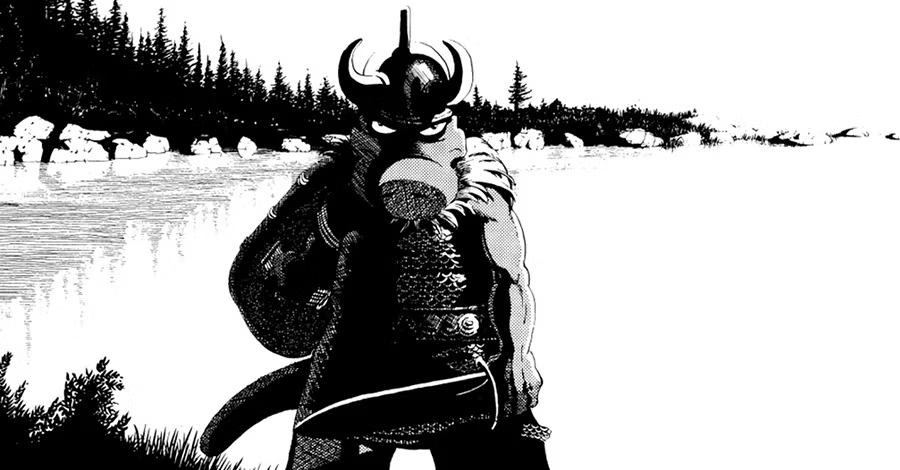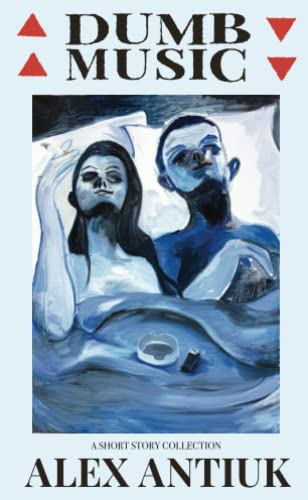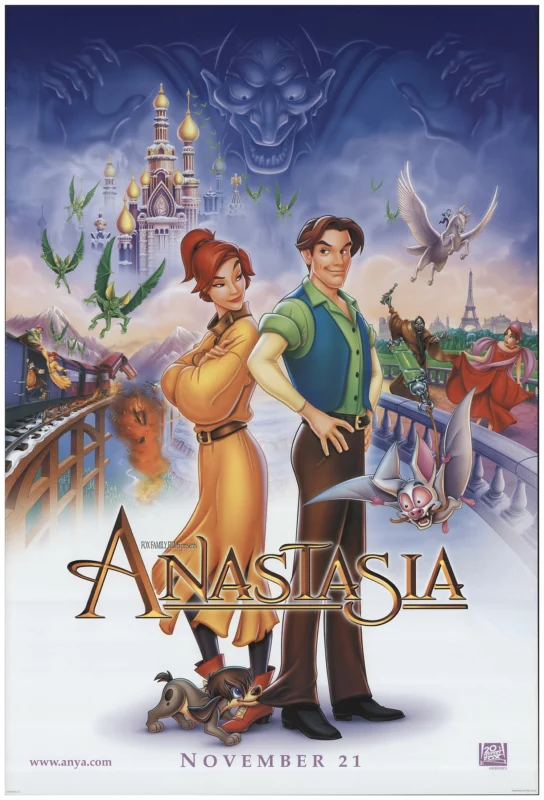Cerebus is an colossal 300-issue comic about an aardvark.
It started in 1977 as a simple one-note parody of Conan the Barbarian. As it gained an audience, it evolved into an ambitious and recondite meditation on politics, religion, gender, and liberty. Then, at the peak of Cerebus‘s critical and commercial popularity, its artist began going mad.
I have been vaguely aware of Cerebus for a long time. It exists like a terrible mountain in the indie comics landscape, littered with tattered flags and the bodies of inexperienced hikers. It has a reputation, and not a good one. Whenever it’s discussed, people immediately quarantine themselves from the creator. I don’t agree with Dave Sim, but… or Dave Sim’s views on women are repellant, but… Tom Ewing’s lengthy and excellent writeup of Cerebus finally inspired me to read its 6,000 pages for myself.
I went into it with a “don’t believe the noise” approach. I expected it would be a somewhat nice but dated comic that doesn’t really hold up, and that it’s offensive elements would be less offensive than expected. Both of my ideas were wrong.
Cerebus is an astonishing work in all kinds of directions. I have never read a comic with such extremes of good and bad. Everything is at utter polarity: -1 or +1 with no values in between.
My emotions swung from “this is good” to “this is excellent” to “are you kidding me, I cannot believe how great this is”. I read the final 400 pages of the “Church and State” arc in a rush and went to sleep exhausted, as if Dave Sim had used my amygdala like a speedbag. When it’s good, Cerebus is absolutely in a class with Watchman and so forth: a work that tests the limits of the comics medium and finally tears a hole right through them.
And then “Jaka’s Story” immediately throws away everything that made “Church and State” work…but finds new, different ways to be great. Perhaps equally so! It’s small-scale without being trivial; dramatic without being maudlin; brutal without being gratuitous. Audacious stuff, but Sim pulls it off with brass balls. I’m reminded of Bowie (who makes a guest appearance), and his gear-five-to-reverse shifts through styles and fashions.
Not everything Sim touches turns to gold. The satire in “High Society” is fairly broad—politicians are greedy, religious leaders are hypocrites, Marvel superheroes are silly, and so on. Cheap shots and easy targets. Sim’s pop cultural interests seldom stretch beyond the Great Depression, and can be a bit strange in their construction. I know who Elrod is based on, but why does he talk like Foghorn Leghorn? Often I was struck by the sense that Sim expected me to laugh, but I didn’t know at what, exactly.
The way Sim integrates comedy and drama is impressive: he crafts a world where a throwaway gag can also be load-bearing to the plot. This sucks you deeply into the work: you’re constantly reading between lines, looking at details, waiting for the next shoe to drop. It’s a totally different experience (and a more satisfying one) than, say, modern Marvel movies, which are terrified of confusing the audience and clearly separate humor from drama (shot 1: a scowly gritty action hero says something serious. shot 2: plucky comic relief says a quip.) Sim mixes it all together: Cerebus is streaks and whorls of humor and absurdity and drama, all frozen together in a single sheet of marble.
By “Flight”, cracks are finally starting to appear. Sim appears unsure of the comic’s identity, cyling through retcons and in-jokes. Why bring back a long-forgotten monster-of-the-week from vol 1? Doesn’t it diminish the once-in-a-lifetime cosmic awe of the Ascension to do it AGAIN? What are we doing here? Once Cerebus parodied fantasy, politics, and religion. Now it parodies…Cerebus.
Dave appears to be working under the assumption “I know what the fans want after all that downtime! MORE AKSHUN!”…but I don’t want more action! After the compelling, tightly-woven drama of the previous volumes, I have no desire to watch Cerebus swing a sword around. That is unsatisfying to me. The comic (and the world outside it) have evolved beyond the context where that made sense. Imagine if the Beatles had reunited in 1975, cut their hair in mop-tops, and tried to become a yeah-yeah-yeah skiffle band again. It wouldn’t have worked. Some doors only swing one way.
Soon after that, Dave Sim’s contributions to Gender Discourse emerge. I’m a conservative (unlike most here, I think) and feel directional sympathy to some of Dave’s views. Men and women are different; it’s easy for relationships to pull apart because of this; society is bad at discussing those differences (or even admitting they exist). Sure. There are reasonable arguments to be made for the above.
But Dave’s views are not reasonable. They’re based on resentment. They’re little hacked-out flecks of spite—exacerbated and possibly created by his divorce, drug abuse, and untreated mental health issues—which slowly gather into a rolling avalanche of all-consuming hostility, with Dave and his comic lost in the middle. Dave is worse than wrong. A wrong person can be taught to be right; an irrational ego-monster can’t be reached at all.
Lionel Trilling described conservatism as “a set of irritable mental gestures which seek to resemble ideas.” You may or may not agree in the general case, but it feels true of Dangerous Dave’s worldview. It’s reactive and insubstantial. There’s no “there” there. There’s nothing to support them, and nothing a critic can score blows against. It’s just blind rage, scaffolded to a lot of shallow post-hoc intellectualization. I’m not afraid of weird, outré philosophy. It’d be interesting to read a serious intellectual argument in favor of (say) kicking puppies, if only to see the mental gymnastics involved. Yet there’s fundamentally no substance you can engage with in Dave’s thought. It’s just a guy with more issues than his comic, trauma dumping on you.
It doesn’t work. His gender-obsession infests and paralyzes Cerebus like a cordyceps, corrupting even the good parts. “Form and Void” could have been a powerful return to form…but not if you know what Ham and Mary Earnestway represent. Comics are a bad medium for didactic “here’s wot’s wot” preaching anyway, and Dave is forced to rely on all-text passages—first as a crutch, then as a wheelchair—to get his ideas across. All the worse for Cerebus, because Dave’s prose can kill an ox at a dozen paces. I skipped a lot of text in Cerebus‘s final 100 issues. Life’s too short.
At some point, Dave and reality part ways. It takes a while for you to notice that the author of Cerebus has gone mad, but eventually you DO notice. The earliest warning sign comes in Cerebus #12, where Deni Sim mentions that her husband has suffered a mental breakdown. She would later supply more details: he freaked out on acid, punched a hole in a wall, and she and his mother had him committed. (Dave disputes this: he went of his own free will and the wall-punching never happened).
Either way, the “classic” Cerebus run (“High Society” thru “Melmoth”) was likely made by a troubled man. If Dave Sim wasn’t on the struggle bus by the late 70s, he’d at least bought the ticket. I don’t say this to castigate or excuse Dave, but it feels important. There’s no “sane” Dave Sim that can be quarantined off from the rest. He didn’t get bumped on the head in 1991 and turn into Mr Hyde. His mental decline was gradual. Did incipient madness fuel the good parts of Cerebus, in some weird way? I don’t know, but on paper, a comic like “Melmoth” seems like a terrible idea. And yes, you might call it insane. Why put Oscar Wilde in your talking aardvark comic? Yes, it 100% works in practice, but it’s an artistic swerve that few normal artists would consider.
Dave’s peculiarity metastasizes into hatefulness. Long before Issue #186, we start getting weird little rants in the introductions page. Like that bizarre “sir, this is a Wendy’s” tirade in #103 about gay men and AIDS and bath houses. It’s an oft-noted phenomenon that websites with “truth” in their name have none in their contents. You could devise a similar aphorism for essays beginning with “here’s a thought”.
And then there’s the intro letter (I forget the issue) where he describes a woman at a bar grabbing his wrist and forcing him to dance with her (I may be misremembering the specifics). It’s totally reasonable to be annoyed by that, but then he goes on a proto-incel rant about how this is a CLASSIC EXAMPLE of how WOMEN exploit their POWER over MEN to (etc). It was viscerally unpleasant to read, like something you’d see on /r/PussyPassDenied.
A lot of men feel Sim-like impulses at times. At a Static-X show I was assaulted by a woman and felt anger, some of which settled on her gender—”Yeah, it’s cool how you can punch me and know I’m not allowed to hit you back”. Then I calmed down and realized I was being foolish. I hadn’t witnessed some dark gynocratic evil that lurks at the heart of Woman(tm). I’d merely had an unpleasant encounter with a stranger.
For whatever reason, Dave seems incapable of those realizations. Everything that happens is Deep and Important to him. It’s a common schizoaffective trope to see deep meaning inside random things, but honestly, I think all humans are wired up that way, at least a little. We all have a Viktor Davis inside us, trying to get out. We just have to ensure that our personal Cerebus issue #186 gets lost in the mail.
Religion? Dave didn’t find God, God found Dave. In principle, a religious conversion should be a humbling experience—you’re broken down, and forced to rethink your life and values basically from square one. But all too often, it’s a moment of personal narcissism. You have discovered The Truth(tm). You are wise, and other people are foolish. Dave’s conversion seems like the second kind: a chance to take all of his prejudices and rewrite them in permanent “God says it” ink.
What changes when Dave found God? Nothing. He didn’t like women before or after he converted. He was paranoid before and after he converted. His comic remains a dismaying wreckage-field (strewn with broken beauty and rubbish) before and after he converted. His shoggoth-philosophy sprouted a few more mutant heads and limbs, but that’s it. How kind of God to confirm that all of Dave’s pre-existing views were correct.
At least his triple-conversion to Christianity, Islam, and Judaism is fairly unique and interesting. Based on what I’ve seen, he now seems to be turning into a yet another Fox News viewer (or the Canadian equivalent): his brain foaming with worms, obsessed with Muslims and liberals and Covid, mad in the most boring way possible. If Cerebus had been completed a decade later, I suspect we’d be reading arcs about Barack HUSSEIN Obummer, with Hillary Clinton cackling inside her Cirinist hood. So I suppose there’s always that: Cerebus could have been even worse.
Was Dave ultimately a force for good in independent comics? He seems almost like a cautionary tale. If you were a businessman with an algorithm instead of a soul and you wanted to make a case that artists should be shackled to their desks and forced to crank out product…wouldn’t Cerebus literally be the first case you point to? “Here’s what happens when an artist controls their own work. Cerebus happens.”
Dave Sim destroyed his life’s work. Not only did he ruin Cerebus, he salted the earth beneath it, ensuring it would never come back in the hands of another. Maybe that was the plan all along. There will be no Cerebus revival; the world is slowly forgetting it. Casual discussion of Cerebus online is dominated by shock and outrage over its creator’s Bad and Wrong views—nobody seems to care much about the actual comic. Which is sad, because the comic is often extremely good!
Tom and his commenters have compared Dave to Stan Sakai and Eiichiro Oda. You could also compare him to his longtime acquaintance Harlan Ellison: notorious SF gadly. Discussion of Ellison generally revolves around his personality, not his stories. One can be too good at self-promotion.
For better and for worse, Cerebus will remain a weird, fascinating, horrible curate’s egg. It’s like a drug. One hit makes you feel good, as does two. But eventually you stop feeling good; you have a terrible habit that you must either quit or die from. Except in the case of Cerebus, you don’t die at the end. You have read a disappointing comic, which is basically the same as dying if you think about it (I didn’t.) There’s not really a good place to stop reading Cerebus: either you leave trailing pieces of story unfinished, or you soldier through to the end, and then wonder if it was worth it.
At least we’ll never get a JJ Abrams movie where a CGI Cerebus wears sunglasses and floss-dances and says “that’s not a thing”. Again, it could have been worse.
No Comments »


